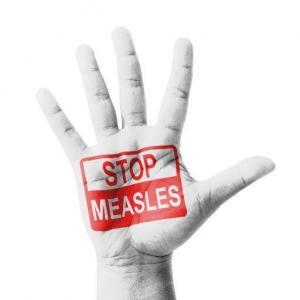
As we’re sure you’ve heard, all over the news, the measles virus has made a comeback in the U.S. in full force. within the past five years, 75 percent of measles cases reported to the Centers for Disease Control and Prevention have occurred in various insular communities, among them the Amish in Ohio, the Somali community in Minnesota, Eastern European groups in the Pacific Northwest and the ultra-Orthodox Jewish communities in New York. These occurrences are usually caused by a lack of vaccinations within these communities. Now, the measles virus is spreading. Virally. We have put together a measles Q&A on everything that you need to know and then some. Please reach out to us if we have not answered your questions and one of our providers will be happy to help you.
Q1: What is the Measles Virus?
A: According to Iftikhar Ali, MD, Medical Director for AFC Urgent Care: “Measles is a highly contagious disease. The only way to protect yourself is being vaccinated. If you are not sure about your vaccination status, it can be tested with a simple blood test for MMR ( Measles/Mumps/Rubella). If you are not immune, you should get a booster dose of MMR. If someone comes in contact with a patient who is diagnosed with measles and is not sure about his/her MMR vaccination status, he/she should go to a health care facility within 72 hours to receive the MMR booster vaccine to prevent the disease. If it is over 72 hours, you should go to the Emergency Department of the nearest hospital within 6 days to receive immunoglobulin”
Q2: What are the signs and symptoms of measles?
A: Measles signs and symptoms appear around 10 to 14 days after exposure to the virus. Signs and symptoms of measles typically include: First:
- fever
- cough
- runny nose
- red, watery eyes ( conjunctivitis)
Next, people experience:
- Three to five days after symptoms begin, a rash will break out, and present as flat red spots that appear on the face at hairline, and spread downward to the neck, trunk, arms, legs and feet. Small raised bumps may also appears on top of the flat red spots.
If experiencing any of these symptoms, please contact a medical professional immediately.
Q3: What are the stages of measles?
- Infection and incubation. For the first 10 to 14 days after you’re infected, the measles virus incubates. This is one of the main reasons measles is so contagious- people can be walking around with the measles virus without any knowledge of it. In the meantime they are infecting those around them who have not been immunized, which can include babies under the age of 12 months who have not yet gotten their Measles/Mumps/Rubella vaccine (MMR).
- Nonspecific signs and symptoms. Measles typically begins with a mild to moderate fever, often accompanied by a persistent cough, runny nose, inflamed eyes and sore throat. This relatively mild illness may last two or three days.
- Acute illness and rash. The rash consists of small red spots, some of which are slightly raised. Spots and bumps in tight clusters give the skin a splotchy red appearance. The face breaks out first. Over the next few days, the rash spreads down the arms and trunk, then over the thighs, lower legs and feet.
- Communicable period. A person with measles can spread the virus to others for about eight days, starting four days before the rash appears and ending when the rash has been present for four days.
Q4: What are the causes of measles?
Measles is a highly contagious illness caused by a virus that replicates in the nose and throat of an infected child or adult. Then, when someone with measles coughs, sneezes or talks, infected droplets spray into the air, where other people can inhale them. The infected droplets may also land on a surface, where they remain active and contagious for several hours. You can contract the virus by putting your fingers in your mouth or nose or rubbing your eyes after touching the infected surface. About 90 percent of non-immune people who are exposed to someone with the virus will be infected.
Q5: Is the measles virus treatable?
There’s no specific treatment for an established measles infection.
Q6: Is the measles virus preventable?
Resounding Yes!
- Vaccinate. Be sure that anyone who’s at risk of getting the measles who hasn’t been fully vaccinated receives the measles vaccine (link opens in new tab) as soon as possible. This includes anyone under 65 years old who hasn’t been vaccinated, as well as infants older than 6 months.
- The first dose for infants is usually given between 12-15 months, with the second dose typically given between ages four and six years.
- Isolation. Because measles is highly contagious from about four days before to four days after the rash breaks out, people with measles shouldn’t return to activities in which they interact with other people during this period. It may also be necessary to keep non-immunized people — siblings, for example — away from the infected person.
Remember: When you get the measles vaccine, you are not only protecting yourself against illness, but you are protecting everyone around you.
Get your Measles Vaccine Today!
If you or a loved one is developing flu like symptoms you can walk right into our urgent care center, no appointment necessary, at 1030 Boulevard, West Hartford, CT 06119-1801. At AFC Urgent Care West Hartford, we are open 7 days a week and ready to treat you. You can save time by checking in online and we accept most insurances.


